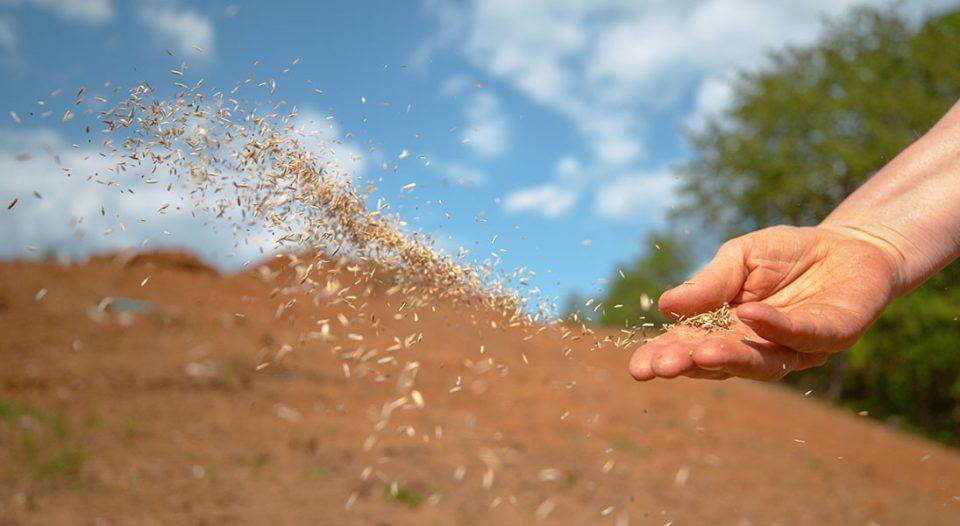Lectionary for July 23, 2023
Eighth Sunday after Pentecost
Isaiah 44:6-7; Psalm 86:11-17;
Romans 8:12-25; Matthew 13:24-30, 36-43
One thing I love about these parables is that every three years I’m a different person. I read the texts differently, and they read me differently. The disciple of Hillel the Elder, Ben Bag Bag (not kidding), said of Scripture: “Turn it over, and turn it over, for all is therein. And look into it; and become gray and old therein; and do not move away from it, for you have no better portion than it” (Pirke Avot 5:22). So we turn and turn over these parables year after year to see if perhaps we might catch a new facet of the gem that is Scripture.
We know the parable of the good and bad seed. A landlord sows good seed in his field. Once the grain starts to ripen and show its produce, the master’s servants question him, asking if he hadn’t sown good seed after all. If not, where did the bad seed come from? The landlord knows right away that it was his enemy, who had purposefully come to hurt him. The “tares” in this passage are, after all, bearded darnel, which looks like wheat until it shows dark seeds that host a toxic fungus. This doesn’t just mess up the field. Sowing the bad seed is attempted murder of the landlord’s customers. If the darnel is harvested with the grain, people could be seriously ill or possibly die.
Every year I focus on the agency of the landlord character—the analogy of God. The landlord tells the servants not to disrupt or remove the darnel, because doing so might upset the wheat. Instead, they are allowed to grow together until harvesttime. Jesus is explicit: the darnel will be gathered first, bound and thrown away into the fire (Matthew 13:30). God spares the bad seeds/plants until the very end of things.
As an aside, I don’t believe in the relatively late idea (mostly 18th-19th century) of a premillennial “rapture” of Christians away from the earth, leaving other folks behind. This passage is one of the many reasons why most mainline Protestant, Catholic and Orthodox Christians don’t either. In Jesus’ words, the good seeds/plants are left around, and the bad seeds/plants are first gathered and taken away. I mourn the infection of far too many congregations with “rapture theology” from The Late, Great Planet Earth or the “Left Behind” book series popular a couple decades ago.
A landlord sows good seed in his field. Once the grain starts to ripen and show its produce, the master’s servants question him, asking if he hadn’t sown good seed after all.
While I usually focus on God’s patient grace in this parable, I’ve also usually missed the intentional sneakiness of the enemy’s plan. I don’t think the devil is out there creating people. Much more nefariously, the evil one is planting disciples of death whom he hopes will be confused for purveyors of the kingdom of heaven. Just like the bearded darnel hosts toxic growth that can make you sick, a bunch of religious leaders are out there pretending to speak for God but instead are peddling toxic religion that aims to make the body of Christ ill.
Just opening Christian Twitter (I know, I know, I’m trying to quit) and seeing all the hate aimed at people who God loves is heartbreaking. There are whole (non)denominations exploding with growth because adherents feel energized to attack queer folks, foreigners or people devoted to justice. Jesus shows a better way, with a warning: “Truly I tell you, just as you did it to one of the least of these who are members of my family, you did it to me” (Matthew 25:40).
The takeaway from the parable of the seeds is to be grateful for God’s gracious patience. People can and do change and grow away from harmful beliefs. I’m proof of that. But just because God allows the dangerous plants sowed by the enemy in the field to grow doesn’t mean we have to pretend that they are delicious or healthy! Death-dealing theologies that minimize God’s grace, or limit God’s love to the people they agree with, must be called out for the sake of everyone involved. Jesus did this during his earthly ministry, and Martin Luther did it during the Reformation. Now it is our turn to be healthy plants, bearing healthy fruit and showing the greatest possible difference from the deadly plants of the evil one.





